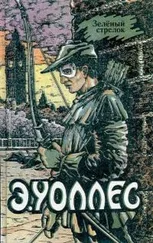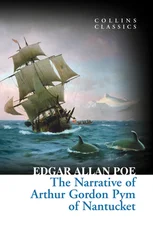Эдгар По - Narrative Of A. Gordon Pym
Здесь есть возможность читать онлайн «Эдгар По - Narrative Of A. Gordon Pym» весь текст электронной книги совершенно бесплатно (целиком полную версию без сокращений). В некоторых случаях можно слушать аудио, скачать через торрент в формате fb2 и присутствует краткое содержание. Жанр: Классическая проза, на английском языке. Описание произведения, (предисловие) а так же отзывы посетителей доступны на портале библиотеки ЛибКат.
- Название:Narrative Of A. Gordon Pym
- Автор:
- Жанр:
- Год:неизвестен
- ISBN:нет данных
- Рейтинг книги:5 / 5. Голосов: 1
-
Избранное:Добавить в избранное
- Отзывы:
-
Ваша оценка:
- 100
- 1
- 2
- 3
- 4
- 5
Narrative Of A. Gordon Pym: краткое содержание, описание и аннотация
Предлагаем к чтению аннотацию, описание, краткое содержание или предисловие (зависит от того, что написал сам автор книги «Narrative Of A. Gordon Pym»). Если вы не нашли необходимую информацию о книге — напишите в комментариях, мы постараемся отыскать её.
Narrative Of A. Gordon Pym — читать онлайн бесплатно полную книгу (весь текст) целиком
Ниже представлен текст книги, разбитый по страницам. Система сохранения места последней прочитанной страницы, позволяет с удобством читать онлайн бесплатно книгу «Narrative Of A. Gordon Pym», без необходимости каждый раз заново искать на чём Вы остановились. Поставьте закладку, и сможете в любой момент перейти на страницу, на которой закончили чтение.
Интервал:
Закладка:
The overturning of the brig, even with the consequent loss of the wine and turtle, would not, in fact, have rendered our situation more deplorable than before, except for the disappearance of the bedclothes by which we had been hitherto enabled to catch rainwater, and of the jug in which we had kept it when caught; for we found the whole bottom, from within two or three feet of the bends as far as the keel, together with the keel itself, thickly covered with large barnacles, which proved to be excellent and highly nutritious food. Thus, in two important respects, the accident we had so greatly dreaded proved to be a benefit rather than an injury; it had opened to us a supply of provisions which we could not have exhausted, using it moderately, in a month; and it had greatly contributed to our comfort as regards position, we being much more at ease, and in infinitely less danger, than before.
The difficulty, however, of now obtaining water blinded us to all the benefits of the change in our condition. That we might be ready to avail ourselves, as far as possible, of any shower which might fall we took off our shirts, to make use of them as we had of the sheets — not hoping, of course, to get more in this way, even under the most favorable circumstances, than half a gill at a time. No signs of a cloud appeared during the day, and the agonies of our thirst were nearly intolerable. At night, Peters obtained about an hour's disturbed sleep, but my intense sufferings would not permit me to close my eyes for a single moment.
August 5. To-day, a gentle breeze springing up carried us through a vast quantity of seaweed, among which we were so fortunate as to find eleven small crabs, which afforded us several delicious meals. Their shells being quite soft, we ate them entire, and found that they irritated our thirst far less than the barnacles. Seeing no trace of sharks among the seaweed, we also ventured to bathe, and remained in the water for four or five hours, during which we experienced a very sensible diminution of our thirst. Were greatly refreshed, and spent the night somewhat more comfortably than before, both of us snatching a little sleep.
August 6. This day we were blessed by a brisk and continual rain, lasting from about noon until after dark. Bitterly did we now regret the loss of our jug and carboy; for, in spite of the little means we had of catching the water, we might have filled one, if not both of them. As it was, we contrived to satisfy the cravings of thirst by suffering the shirts to become saturated, and then wringing them so as to let the grateful fluid trickle into our mouths. In this occupation we passed the entire day.
August 7. Just at daybreak we both at the same instant descried a sail to the eastward, and _evidently coming towards us!_ We hailed the glorious sight with a long, although feeble shout of rapture; and began instantly to make every signal in our power, by flaring the shirts in the air, leaping as high as our weak condition would permit, and even by hallooing with all the strength of our lungs, although the vessel could not have been less than fifteen miles distant. However, she still continued to near our hulk, and we felt that, if she but held her present course, she must eventually come so close as to perceive us. In about an hour after we first discovered her, we could clearly see the people on her decks. She was a long, low, and rakish-looking topsail schooner, with a black ball in her foretopsail, and had, apparently, a full crew. We now became alarmed, for we could hardly imagine it possible that she did not observe us, and were apprehensive that she meant to leave us to perish as we were — an act of fiendish barbarity, which, however incredible it may appear, has been repeatedly perpetuated at sea, under circumstances very nearly similar, and by beings who were regarded as belonging to the human species. {2} 2 The case of the brig _Polly_, of Boston, is one so much in point, and her fate, in many respects, so remarkably similar to our own, that I cannot forbear alluding to it here. This vessel, of one hundred and thirty tons burden, sailed from Boston, with a cargo of lumber and provisions, for Santa Croix, on the twelfth of December, 1811, under the command of Captain Casneau. There were eight souls on board besides the captain- the mate, four seamen, and the cook, together with a Mr. Hunt, and a negro girl belonging to him. On the fifteenth, having cleared the shoal of Georges, she sprung a leak in a gale of wind from the southeast, and was finally capsized; but, the masts going by the board, she afterward righted. They remained in this situation, without fire, and with very little provision, for the period of one hundred and ninety-one days (from December the fifteenth to June the twentieth), when Captain Casneau and Samuel Badger, the only survivors, were taken off the wreck by the Fame, of Hull, Captain Featherstone, bound home from Rio Janeiro. When picked up, they were in latitude 28 degrees N., longitude 13 degrees W., having drifted above two thousand miles! On the ninth of July the Fame fell in with the brig Dromero, Captain Perkins, who landed the two sufferers in Kennebeck. The narrative from which we gather these details ends in the following words:
In this instance, however, by the mercy of God, we were destined to be most happily deceived; for, presently we were aware of a sudden commotion on the deck of the stranger, who immediately afterward ran up a British flag, and, hauling her wind, bore up directly upon us. In half an hour more we found ourselves in her cabin. She proved to be the Jane Guy, of Liverpool, Captain Guy, bound on a sealing and trading voyage to the South Seas and Pacific.
Chapter 14
THE _Jane Guy_ was a fine-looking topsail schooner of a hundred and eighty tons burden. She was unusually sharp in the bows, and on a wind, in moderate weather, the fastest sailer I have ever seen. Her qualities, however, as a rough sea-boat, were not so good, and her draught of water was by far too great for the trade to which she was destined. For this peculiar service, a larger vessel, and one of a light proportionate draught, is desirable- say a vessel of from three hundred to three hundred and fifty tons. She should be bark-rigged, and in other respects of a different construction from the usual South Sea ships. It is absolutely necessary that she should be well armed. She should have, say ten or twelve twelve-pound carronades, and two or three long twelves, with brass blunderbusses, and water-tight arm-chests for each top. Her anchors and cables should be of far greater strength than is required for any other species of trade, and, above all, her crew should be numerous and efficient- not less, for such a vessel as I have described, than fifty or sixty able-bodied men. The Jane Guy had a crew of thirty-five, all able seamen, besides the captain and mate, but she was not altogether as well armed or otherwise equipped, as a navigator acquainted with the difficulties and dangers of the trade could have desired.
Captain Guy was a gentleman of great urbanity of manner, and of considerable experience in the southern traffic, to which he had devoted a great portion of his life. He was deficient, however, in energy, and, consequently, in that spirit of enterprise which is here so absolutely requisite. He was part owner of the vessel in which he sailed, and was invested with discretionary powers to cruise in the South Seas for any cargo which might come most readily to hand. He had on board, as usual in such voyages, beads, looking-glasses, tinder-works, axes, hatchets, saws, adzes, planes, chisels, gouges, gimlets, files, spokeshaves, rasps, hammers, nails, knives, scissors, razors, needles, thread, crockery-ware, calico, trinkets, and other similar articles.
The schooner sailed from Liverpool on the tenth of July, crossed the Tropic of Cancer on the twenty-fifth, in longitude twenty degrees west, and reached Sal, one of the Cape Verd islands, on the twenty-ninth, where she took in salt and other necessaries for the voyage. On the third of August, she left the Cape Verds and steered southwest, stretching over toward the coast of Brazil, so as to cross the equator between the meridians of twenty-eight and thirty degrees west longitude. This is the course usually taken by vessels bound from Europe to the Cape of Good Hope, or by that route to the East Indies. By proceeding thus they avoid the calms and strong contrary currents which continually prevail on the coast of Guinea, while, in the end, it is found to be the shortest track, as westerly winds are never wanting afterward by which to reach the Cape. It was Captain Guy's intention to make his first stoppage at Kerguelen's Land- I hardly know for what reason. On the day we were picked up the schooner was off Cape St. Roque, in longitude thirty-one degrees west; so that, when found, we had drifted probably, from north to south, _not less than five-and-twenty degrees!_
Читать дальшеИнтервал:
Закладка:
Похожие книги на «Narrative Of A. Gordon Pym»
Представляем Вашему вниманию похожие книги на «Narrative Of A. Gordon Pym» списком для выбора. Мы отобрали схожую по названию и смыслу литературу в надежде предоставить читателям больше вариантов отыскать новые, интересные, ещё непрочитанные произведения.
Обсуждение, отзывы о книге «Narrative Of A. Gordon Pym» и просто собственные мнения читателей. Оставьте ваши комментарии, напишите, что Вы думаете о произведении, его смысле или главных героях. Укажите что конкретно понравилось, а что нет, и почему Вы так считаете.












